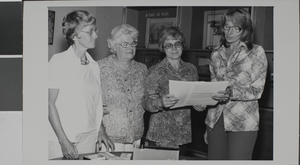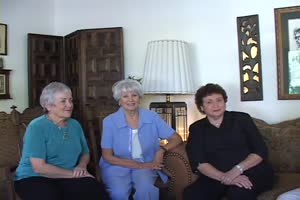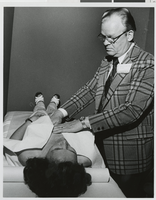Search the Special Collections and Archives Portal
Search Results
Jean Ford Papers
Identifier
Abstract
The Jean Ford Papers (1958-1996) include political documents, campaign materials for Jean Ford's political campaigns, and materials pertaining to campaign issues such as health services, general improvement districts, and parks and recreation. There is extensive material on Red Rock National Conservation Area, Lake Mead National Recreation Area, and the National Issues Forum. Women's issues cover the years 1964-1981 and contain information relating to the League of Women Voters, Equal Rights Amendment (ERA), and International Women's Year (IWY), as well as Anti-ERA and Anti-IWY materials.
Archival Collection
Janet Kravenko oral history interview
Identifier
Abstract
Oral history interview with Janet Kravenko conducted by Bridget Kelly on August 07, 2002 for the Women's Research Institute of Nevada (WRIN) Las Vegas Women Oral History Project. Kravenko opens her interview by discussing the importance of dance to her family, and her early interest in becoming a member of the Bluebell Girls dance troupe. She describes the rules of touring as a Bluebell Girl and her experiences traveling the world for two years. She then discusses her first contract in Las Vegas, Nevada at the Lido de Paris show. She describes the daily life of a Bluebell Girl, and where they rehearsed and performed. Kravenko then talks about being a young performer in Las Vegas and the challenges of finding work. She also describes some of the famous people she worked with including Zsa Zsa Gabor and Major Riddle. Lastly, Kravenko discusses how her dance career changed after she became a mother.
Archival Collection

Photographs of donations to Special Collections, Las Vegas, July, 12, 1977
Date
Archival Collection
Description
Image
Renee Diamond Papers
Identifier
Abstract
The Renee Diamond Papers date from 1972 to 2000 and consist primarily of political and professional materials including reports, correspondence, publications, newsletters, and planning documents collected by Diamond throughout her career. Diamond supported the feminist movement as a member of the National Organization for Women and held leadership roles in the Democratic party in Las Vegas, Nevada. The collection also documents Diamond’s campaigns for the Nevada State Assembly and includes material from her one term in the legislature.
Archival Collection
Mary Ward oral history interview
Identifier
Abstract
Oral history interview with Mary Ward conducted by Irene Rostine on March 14, 2012 for the Women's Research Institute of Nevada (WRIN) Las Vegas Women Oral History Project. Ward discusses moving to Nevada in the 1950s with her husband to live closer to his family. She describes living in both Pahrump and Las Vegas, Nevada, and the commute between both cities. Ward then talks about the various places she was employed including the County Commissioner's office and the local telephone company. She also worked as a telephone operator at the Frontier Hotel and Casino, Sands Hotel and Casino, and the Flamingo Hotel. She goes on to talk about the duties telephone operators had, how important the union was for telephone operators because of unfair retribution, lack of stability, and the need for worker's rights. Additional comments are provided by a person identified as Opal.
Archival Collection
Phyllis Martin Papers
Identifier
Abstract
The Phyllis Martin Papers (1988-1999) is comprised of North Las Vegas, Nevada reports and marketing materials, Nevada Women's History Project event invitations and pamphlets, a Kiel Ranch historical site building survey and Friends of Kiel Ranch newsletter, and newsletters, event programs, and photographs related to women's political involvement in Nevada. The collection includes materials relating to Martin's career in the Office of Economic Development, her involvement as a historian in the preservation of Kiel Ranch, and roles on planning committees for various local events.
Archival Collection

Video of interview with Renee Diamond, Dorothy Eisenberg, and Roberta Gang by Adat Ari El Sisterhood, Las Vegas (Nev.), circa 2007
Date
Archival Collection
Description
Renee Diamond, Dorothy Eisenberg, and Roberta (Bobby) Gang discuss their early lives in Las Vegas, including their experiences as a Jewish women and social activists in Southern Nevada.
Moving Image

Photograph of Dr. Gerald Jones performing an exam, Las Vegas (Nev.), June 1977
Date
Archival Collection
Description
Image
Jackie Brantley oral history interview
Identifier
Abstract
Oral history interview with Jackie Brantley conducted by Claytee White on October 27, 1996 for the Women's Research Institute of Nevada (WRIN) Las Vegas Women Oral History Project. Brantley begins her interview by briefly discussing her family history and parents' jobs in Las Vegas, Nevada in the late 1940s. Brantley then goes on to discuss segregation in Las Vegas. She discusses segregation on the Strip, and in pools, schools, and nightclubs. Afterwards, Brantley discusses her career experiences working for the Clark County School District and her management position at the Desert Inn Hotel and Casino in the early 1970s.
Archival Collection

Photograph of people on railroad track, Caliente (Nev.), 1900s
Date
Archival Collection
Description
Image
